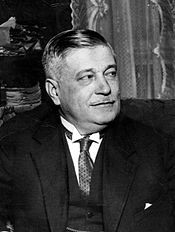
Stanisław Wojciechowski was a Polish politician and scholar who served as President of Poland between 1922 and 1926, during the Second Polish Republic.
Sanation was a Polish political movement that was created in the interwar period, prior to Józef Piłsudski's May 1926 Coup d'État, and came to power in the wake of that coup. In 1928 its political activists would go on to form the Nonpartisan Bloc for Cooperation with the Government (BBWR).

Gabriel Józef Narutowicz was a Polish professor of hydroelectric engineering and politician who served as the first President of Poland from 11 December 1922 until his assassination on 16 December, five days after assuming office. He previously served as the Minister of Public Works from 1920 to 1922 and briefly as Minister of Foreign Affairs in 1922. A renowned engineer and politically independent, Narutowicz was the first elected head of state following Poland's regained sovereignty from partitioning powers.

Kazimierz Władysław Bartel was a Polish mathematician, freemason, scholar, diplomat and politician who served as 15th, 17th and 19th Prime Minister of Poland three times between 1926 and 1930 and the Senator of Poland from 1937 until the outbreak of World War II.

Wincenty Witos was a Polish statesman, prominent member and leader of the Polish People's Party (PSL), who served three times as the Prime Minister of Poland in the 1920s.

Janusz Jędrzejewicz was a Polish politician and educator, a leader of the Sanacja political group, and 24th Prime Minister of Poland from 1933 to 1934.
The Nonpartisan Bloc for Cooperation with the Government was a "non-political" organization in the interwar Second Polish Republic, in 1928–35. It was closely affiliated with Józef Piłsudski and his Sanation movement. Its major activists included Walery Sławek, Kazimierz Bartel, Kazimierz Świtalski, Aleksander Prystor, Józef Beck, Janusz Jędrzejewicz, Wacław Jędrzejewicz, Adam Koc, Leon Kozłowski, Ignacy Matuszewski, Bogusław Miedziński, Bronisław Pieracki, Adam Skwarczyński, and Janusz Franciszek Radziwiłł.
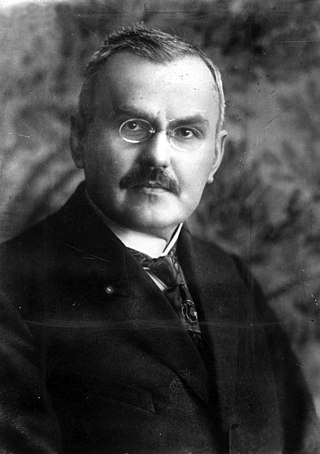
Władysław Dominik Grabski was a Polish National Democratic politician, economist and historian. He was the main author of the currency reform in the Second Polish Republic and served as Prime Minister of Poland in 1920 and from 1923 to 1925. He was the brother of Stanisław Grabski and Zofia Kirkor-Kiedroniowa.

Poland's Ministry of Finance, headed by the Minister of Finance(Minister Finansów), is part of the government of Poland. Among its powers and responsibilities it drafts the national budget, deals with taxes, financing of the local self-governments and issues related to public debt.
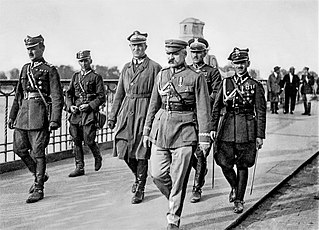
The May Coup was a coup d'état carried out in Poland by Marshal Józef Piłsudski from 12 to 14 May 1926. The attack of Piłsudski's supporters on government forces resulted in an overthrow of the democratically-elected government of President Stanisław Wojciechowski and Prime Minister Wincenty Witos and caused hundreds of fatalities. A new government was installed, headed by Kazimierz Bartel. Ignacy Mościcki became president. Piłsudski remained the dominant politician in Poland until his death in 1935.

Marian Zyndram-Kościałkowski was a Polish politician, freemason and military officer who served as voivode of Białystok Voivodeship in 1930-1934, Mayor of Warsaw in 1934 and 27th Prime Minister of Poland from 1935 to 1936.

Walery Jan Sławek was a Polish politician, freemason, military officer and activist, who in the early 1930s served three times as Prime Minister of Poland. He was one of the closest aides of Polish leader, Józef Piłsudski.
Leon Tadeusz Kozłowski was a Polish archaeologist, freemason, and politician who served as Prime Minister of Poland from 1934 to 1935.
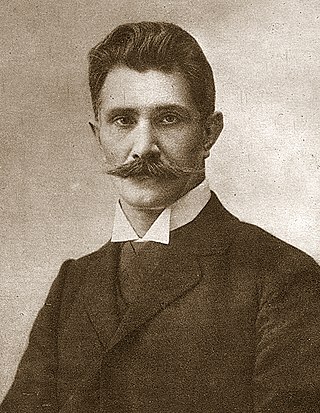
Ignacy Ewaryst Daszyński was a Polish socialist politician, journalist, and very briefly Prime Minister of the Second Polish Republic's first government, formed in Lublin in 1918.
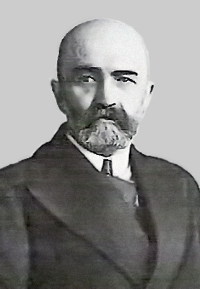
Parliamentary elections were held in Poland on 16 November 1930, with Senate elections held a week later on 23 November. In what became known as the Brest elections, the pro-Sanation Nonpartisan Bloc for Cooperation with the Government took 47% of the vote and 249 of the 444 seats in Sejm and 77 of the 111 seats in the Senate. The elections are known as the least free elections in the Second Polish Republic due to the Brest trial controversy.
A Piłsudskiite was a political supporter of Marshal Józef Piłsudski, the founder of the First World War Polish Legions and the first Chief of State of the Second Republic of Poland. The Piłsudskiites had a major influence on the politics of Poland during the interwar period (1918–1939).

Związek Ludowo-Narodowy was a Polish political party aligned with the National Democracy political movement during the Second Polish Republic, gathering together right-wing politicians with conservative and nationalist opinions.
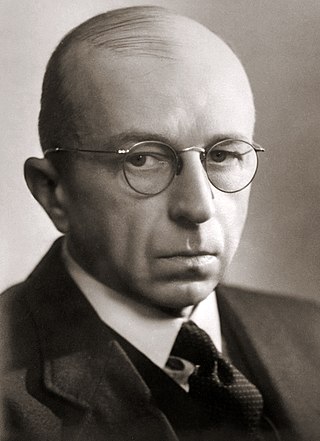
Adam Ignacy Koc was a Polish politician, MP, soldier, journalist and Freemason. Koc, who had several noms de guerre, fought in Polish units in World War I and in the Polish–Soviet War.

Stanisław Car was a Polish politician, lawyer, Marshal of the Sejm, deputy Prime Minister and the Minister of Justice.

Maria Wojciechowska, née Kiersnowska, was the First Lady of Poland from 1922 to 1926 as the wife of President Stanisław Wojciechowski.
